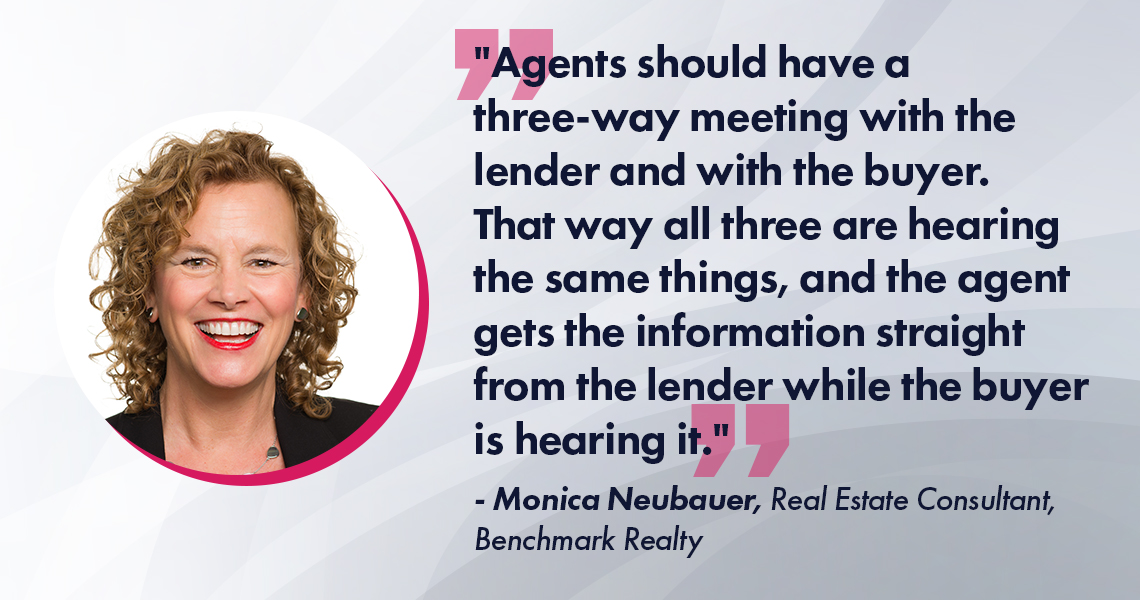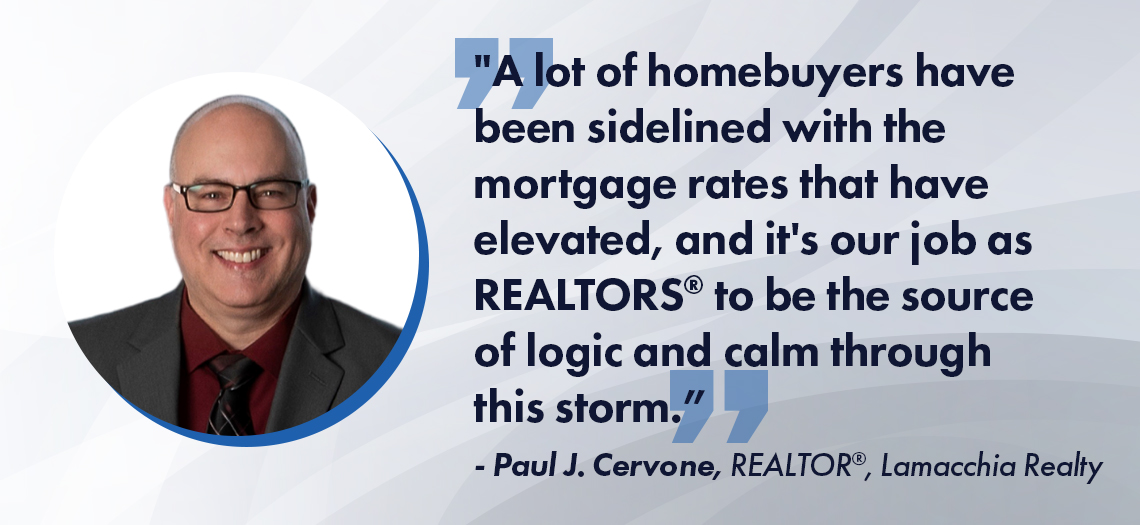When mortgage rates were the lowest in history last year, it wasn’t much of a challenge for homebuyers to make an easy choice on how to finance their new property. Unfortunately, those days are over, at least for the foreseeable future. With rates currently in the 5% to 7% range, agents must be more attuned to the many financing options available. They must also be knowledgeable about jumbo loans, rent-back agreements, cash-offer products and a variety of other options that can help generate business.
The 30-year, fixed-rate mortgage has almost always been the most popular choice for homebuyers, but as rates rise, or when there needs to be some financial flexibility for whatever reason, suddenly the lesser-known mortgages become attractive options. Do you know about them? Could you discuss them with clients if they ask?
Marshall O’Keefe, senior director of business development at Rocket Mortgage in Northville, Michigan, stresses that it is vital for agents to know what to talk about with potential buyers so that they’re not only in the best position for their particular situation, but also feel comfortable and confident that they truly understand the financing options available to them.
“When we think about guiding homebuyers through new financing options, two of the most important things we can do are help educate them on what options are available as well as commit to communicating at a very high level,” he says.
Agreeing in totality with the importance of educating clients is Monica Neubauer, a real estate consultant with Benchmark Realty in Franklin, Tennessee.

“My passion is education for agents and clients, because when we have more knowledge, we have more power and confidence,” she asserts. “Agents should have a three-way meeting with the lender and with the buyer. That way all three are hearing the same things, and the agent gets the information straight from the lender while the buyer is hearing it.
“This is the product we’re choosing, and if there are going to be closing costs that need to be paid by the seller, or some other concession, the agent has to understand it all because in most cases, they will be the one writing up the offer. Another good thing that the agent brings to the three-way meeting is being the one who can ask better questions based on their knowledge of lending and real estate in general.”
Reinventing the Agent Toolbelt
Paul J. Cervone, a REALTOR® with Lamacchia Realty in Woburn, Massachusetts, seconds the education aspect. He has one-on-one buyer consults with each client, adding lenders as deals get closer to finality. “Right now, it’s all about centering with our buyers and moving with a sense of urgency and education, but also reeling in the lender to help educate our buyer pool.”
Cervone also “reinvents the toolbelt” every year, adjusting how and what he presents to clients as financing options depending on what’s happening rate-wise and where homebuyers stand financially.
“A lot of homebuyers have been sidelined with the mortgage rates that have elevated, and it’s our job as REALTORS® to be the source of logic and calm through this storm,” he says. “We have to bring the knowledge and be engaged, so the toolbelt is all about the different finance products that may be available because it’s not a one-size-fits-all type of approach.
“You should have multiple lenders, utilizing their skills and their products. Some of the tools are down-payment assistance programs in your town, community or state that you can leverage. Buydowns were the hot product late last year when we had the 2-1 buydown and the 3-2-1 buydown, where buyers save thousands of dollars on their mortgage. They don’t understand or aren’t even aware of those unless we’re pointing it out to them, so education and the different options are huge seller concessions.
“You can get closing-cost and other concessions with properties that are sitting longer. Plus, it’s giving people a snapshot of where interest rates have been for the past 20 or 30 years. We have to show people that it was an anomaly for two and a half years. Now it’s a reality check, so we really have to elevate our game.”

Newer agents are having to face the same market realities as the homebuyer. It’s been estimated by industry sources that some 250,000 REALTORS® will be exiting the business this year as the challenges multiply from the days of bidding wars for most houses and time on the market from listing to sale being under a week.
Anam Hargey, a REALTOR® with @properties in Glenview, Illinois, transitioned to real estate a few years ago from a career as a licensed therapist. She caught the wave of easy sales but knows that times have changed, and is ready.
“I got spoiled because I started in this anomaly and thought it was easy…list something and it’s done, sold in a day, but now I’m adjusting,” she says. “Education is key, not only for the client, but for myself. Lenders have seminars, are constantly posting, and I’m learning from them, so I know what I can offer clients. I’m making sure I have partnerships with the right lenders, attorneys and other agents and managing brokers. If I don’t know something, I can go to them because I’m still building my toolbelt.”
Neubauer encourages agents to create a spreadsheet keeping track of what each lender offers and what they specialize in, so when a particular buyer is ready to explore financing, it’s easy to match them up with the right bank.
“When I’m either attending a class or speaking in a class, often there are lenders who are sponsoring the class and they share what their niche product is,” she explains. “And yes, lenders have niche products, just like real estate agents have niche areas. There might be somebody who’s really great with down-payment assistance, and you go with them if that’s what you need.
“When you’re attending classes or networking and meeting new lenders, ask them to tell you their niche. What are the best kinds of loans that they do? Some can do all of them in a lot of cases, but they’re not always as good as others, so keep a spreadsheet and mark down which lenders are good at what products.”
Communication with lenders and understanding how they communicate with your homebuyer clients is also important for sales to proceed smoothly. Hargey admits that she lost some clients and contracts in her early days because she wasn’t on the same page as the lenders. Now she makes sure to go back and forth with lenders regularly, even when a sale is not imminent.
“I like to check in every week, ask what the new products are, what the interest rate is, what they are offering, and make sure that communication is clear with my client,” she says. “I like to be on the call when they first start talking to the client to make sure that if there’s something not being answered, I can guide the conversation if needed. A lot of new buyers I work with have no idea that they have so many options.”
Alleviating Buyer Stress Is Crucial
Once a homebuyer engages with a lender, it’s vitally important to make sure there are daily updates in order to keep clients relaxed, according to Neubauer. She implores lenders to over-communicate, and to respond quickly to messages.
“It is a fact that when people are not communicated to, they immediately go to dark, worrisome places,” she says. “So I ask lenders that even if they’ve been working on something, at the end of the day, please follow up to say they’re still working on it. And agents should give a quick text to the lender asking about the timeframe. Because when people are stressed, they need to know that you’re on it.
“I love when a lender has automated systems that let me know the appraisal has been ordered and those kinds of things. Those are lender tools, but you can ask how they are going to communicate with you. Just like we talk to our clients, we need to talk to our lenders, too.”
Cervone puts another layer on communication, insisting that lenders make themselves available more than just weekdays from nine to five.
“You want dealmakers, not dealbreakers, as far as lender partners,” he stresses. “When a lender is incommunicado on a weekend…when do most of our business and deal-writing activities happen? On a Saturday or a Sunday, because our clients are going through open houses or we’re showing houses and then writing deals. If they’re not accessible seven days a week, especially on weekends to crunch some numbers and talk the buyer through scenarios to make sure there’s affordability, to me it’s a non-negotiable deal-killer as far as a partnership goes.”
Asking about the personal finances of buyer clients when it comes to the nitty gritty must be finessed properly.
“One of the most important questions you have to ask a client is how they are going to pay for the house,” posits Neubauer. “But of course we’re not going to ask it like that. Instead, I ask if they will be paying cash or need to arrange financing, with a nice even tone of voice. It lets them know that I think they might be able to pay with cash even if there’s no way they are.
“If you don’t get the answer upfront, you’re potentially showing them houses they cannot afford, and they may not be able to afford anything. Thus, you’re wasting your time and their time. Even if they don’t care, your time and the seller’s time are valuable. If you have an unqualified buyer, that’s a waste of time. And if you do that repeatedly and become known as someone who works with unqualified buyers, it could even affect your relationships or your reputation as a buyer’s agent.”



